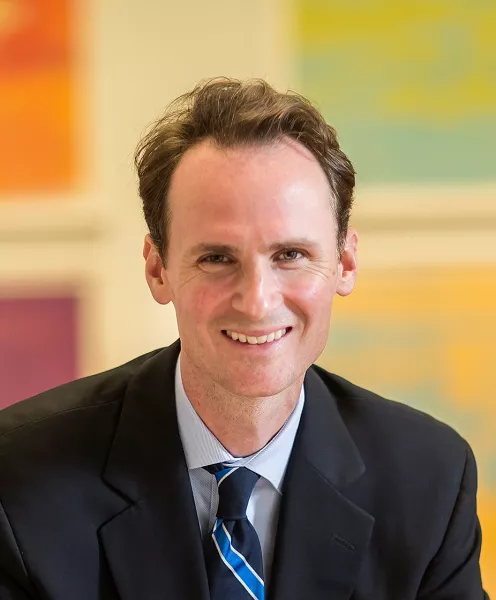
John Palfrey on the importance of libraries in the digital information age
By Annie Pruitt
?Photo credit: Dave White
This story originally appeared in Harvard Law Today.
In an age of eBooks, Google, and Smartphones, many have questioned the importance of libraries. John Palfrey ’01, has penned a new book, which he calls “a love letter to libraries,” that makes the case that libraries are more relevant than ever.
Palfrey, who currently serves as Head of School at Phillips Academy, Andover, and as director of the Berkman Center for Internet & Society, spoke about his new book, “BiblioTech: Why Libraries Matter More Than Ever In An Age of Google,” at HLS on June 22. Palfrey previously served as vice dean for Libraries and Information Resources at Harvard Law School and as executive director of the Berkman Center from 2002 to 2008.
During his book talk, Palfrey challenged the idea that libraries are losing their importance and argued that these institutions play a critical role in the 21st century information infrastructure. Yet, said Palfrey, libraries are threatened by the recent trend toward born-digital materials and dwindling public funding. He stressed the importance of transitioning libraries into the digital future.
“Very often people have a funny view that libraries maybe aren’t as useful as they once were,” said Palfrey, “which is wrong and is why I wrote this book.” Palfrey cited his role as founding chairman of the Digital Public Library of America (DPLA), which began at the Berkman Center for Internet & Society in 2010, and his current role as Head of School at Phillips Academy as partial inspiration for the book.
For Palfrey, the importance of preserving and transitioning libraries into the digital future is closely linked to the origin of public libraries. When large municipal libraries began emerging across the country in the early 20th century, Palfrey said, it was “with an incredibly simple democratic premise: the basic idea that information should be free, knowledge should be free to anyone regardless of their ability to pay.” Yet, he worries that this will not be the case as materials move from the “publicly spirited” hands of libraries into the hands of private cloud and eBook providers.
In order to ensure equal access to information in the digital age, Palfrey believes it is incumbent on libraries to adapt to changes in how individuals access and consume information. In his talk, Palfrey recalled a particularly powerful experience in the Andover library when he witnessed a student who was sitting feet from a librarian turn to his iPhone and ask ‘Siri’ for the definition of terminal velocity.
“There is a tough love story here, which is that when we study young people and how they look for information, librarians are pretty low on that list,” he said.
The future of libraries will be a hybrid of the physical and digital spaces, according to Palfrey.
 One way to achieve this is through initiatives like DPLA, which provides free public access to digitized materials from libraries, archives, and museums across the country.
One way to achieve this is through initiatives like DPLA, which provides free public access to digitized materials from libraries, archives, and museums across the country.
While collecting information into a centralized physical space may have made sense in the analogue era, Palfrey said that by working together and seeing libraries as a connected series of platforms—as part of a network—much more can be accomplished.
This kind of collaboration can already be seen in organizations like the Digital Commonwealth in Massachusetts, which collects, digitizes, and provides free online access to materials gathered from libraries, museums, archives, and historical societies across the state. In the future, Palfrey envisions organizations like the Digital Commonwealth partnering with hubs in other states to create a well-curated national digital ‘library’ of unprecedented size.
In addition to interconnectedness, Palfrey also stressed the importance of developing next-generation libraries in a collaborative way—with open application programming interfaces (APIs)—in order to allow innovation and flexibility in the ways we store, organize, and access information. As collections are digitized, Palfrey said that some individuals may be concerned about losing certain intangibles—like the “serendipity” of browsing physical bookshelves and “coming out with ten books when you thought you were coming out with one.” However, with innovative platforms and the creative use of metadata, he believes that new kinds of serendipity can be introduced into these new hybrid libraries.
While Palfrey believes that physical libraries will continue to play an important role as community gathering places, the challenge is recognizing the new reasons that people come to libraries in the digital era and developing creative ways to serve these needs. “We should dream really, really big,” said Palfrey, “This is the moment when we are designing what public libraries, and scholarly libraries, and school libraries can and should be for the future … This should be a shared vision that we’re really excited about.”
